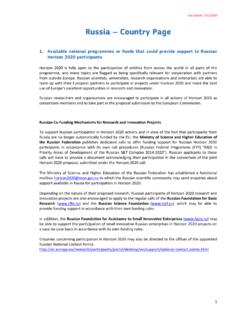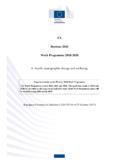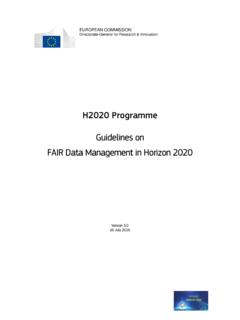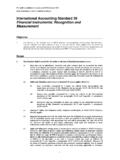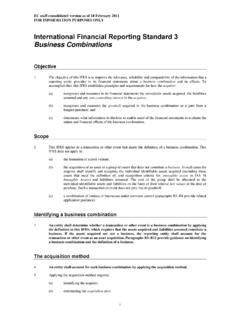Transcription of General Block Exemption Regulation (GBER) Frequently …
1 1 General Block Exemption Regulation (GBER) Frequently Asked Questions Commission Regulation (EC) No 800/2008 of 6 August 2008 declaring certain categories of aid compatible with the common market in application of Articles 87 and 88 of the Treaty State funding that meets the criteria of Article 107(1) TFEU is State aid. This must be notified to and cleared by the Commission before it is paid. The GBER exempts Member States from this notification obligation, as long as all the criteria are fulfilled.
2 So the Regulation simplifies the procedure for aid-granting authorities at national, regional and local levels. It allows them to provide a range of measures clearly favouring job creation and boosting competitiveness, and measures in favour of SMEs. The Commission thus encourages Member States to shift their aid budgets towards better targeted aid that is of real benefit to the European economy and society as a whole. The GBER has nearly tripled the number of Block exempted measures compared to the previous regulations.
3 Moreover, the Commission has substantially increased the aid intensities and notification ceilings for a series of aid measures covered by the previous regulations. This means that higher amounts of SME investment aid, training aid, and employment aid, amongst others, can be granted than before. The GBER also has conditions which aim to ensure that the beneficiary will indeed undertake a project or activity which he would not have done without the aid (incentive effect). The Regulation also leads to increased transparency, which allows third parties and other interested parties, like national judges, to know better if aid has in fact been granted and, if so, which conditions have to be fulfilled for the aid to be compatible.
4 The national aid-granting authorities must ensure that the GBER conditions are respected. The purpose of this document is to give clear answers to some of the questions about how to apply the GBER. It is not intended as comprehensive guidance, but rather is based on the most common questions received mainly from national administrations. This document is a working paper prepared by the Commission services and is not binding on the European Commission as an institution. References to articles and recitals refer to the GBER unless otherwise stated.
5 2 Chapter I COMMON PROVISIONS Art. 1: Scope Is regional aid to the steel, shipbuilding and synthetic fibre sectors covered by the GBER? Are all other categories of aid granted to these sectors covered by the GBER? According to Art. 1(3), regional aid to the steel, shipbuilding and synthetic fibre sectors is excluded from the scope of the GBER. Other categories of aid granted to these sectors are covered by the GBER. In light of recital 14, could support to the food sector qualify as a regional aid scheme exempted under the GBER?
6 Where regional aid schemes are targeted at particular sectors, they are likely to have sectorial rather than horizontal effects and for this reason should not be covered by the Exemption from notification. Aid in support of the food sector would seem to have identifiable sectorial rather than horizontal effects, even though the concept of the food sector is wide and it would be possible to distinguish several subsectors. For this reason, the food sector should be considered as a "specific sector" and consequently, an aid scheme in support of this sector could not qualify as regional aid exempted from notification under Art.
7 13. Could aid to a company active in the primary production of agricultural products and in the processing of those products providing support for the launch of a website for online trading for both types of products be covered by the GBER? The launch of a website for online trading of agricultural products (whether primary or processed) is a step in the marketing of agricultural products. Therefore, the financing of the whole website may be covered by the GBER. Could an aid scheme for alternative activities of agricultural undertakings ( for various non-agricultural activities falling under industrial and service sectors) be based on Article 13 and be considered horizontal aid and not sectorial aid for agriculture, as stated in recital 14?
8 3 Pursuant to Article 1(4), the GBER does not apply to regional aid schemes which are targeted at specific sectors of economic activity within manufacturing or services. A scheme whereby aid is granted for alternative activities of agricultural undertakings would in principle qualify as sectorial aid, since it would be limited to certain non-agricultural activities of companies active in agriculture, and these could be considered as targeted at a specific sector.
9 So it would need to be notified. Is it possible to approve a State aid scheme covering several categories under the GBER (for example, aids for consultancy in favour of SMEs as well as aid for R&D projects)? Should records regarding different categories of the same aid scheme exempted under the GBER be kept separate? A State aid scheme containing different categories under the GBER, covered in one national legal basis, can be approved. The national legal basis for the category of aid concerned should be indicated on the information sheets for GBER that must be sent to the Commission.
10 If all the categories are based on the same national legal basis, one information sheet can be submitted, otherwise several information sheets are required. The aid grantor should demonstrate that the maximum aid ceilings are respected for each category of aid (taking into account the cumulation rules in the GBER) and keep separate records for each category of aid. According to Art. 1(6)(c), the GBER does not apply to aid granted to undertakings in difficulty.


